Hello everyone! My name is Vlada from Thomas-Morus-Heim and today I will tell you about how different European countries celebrate New Year’s! Did you already decorate your house with garlands? Or maybe you are watching “Home alone” or humming the famous Abba song “Happy New Year”? If everything is so, then one of the most important holidays of the year is coming - New Year’s!
There are only a few days left until New Year’s Eve. Vienna is already decorated with garlands, Christmas markets delight us with punch and sweets, and we are diligently looking for and packing gifts for our family and friends. Before students go back home to spend the holidays with their families, I fortunately had the opportunity to talk to some of the students who live at Thomas-Morus-Heim. I was intrigues about their New Year's traditions in their home country.
#1 Christmas and New Year's in Hungary. With Valentine Timár.
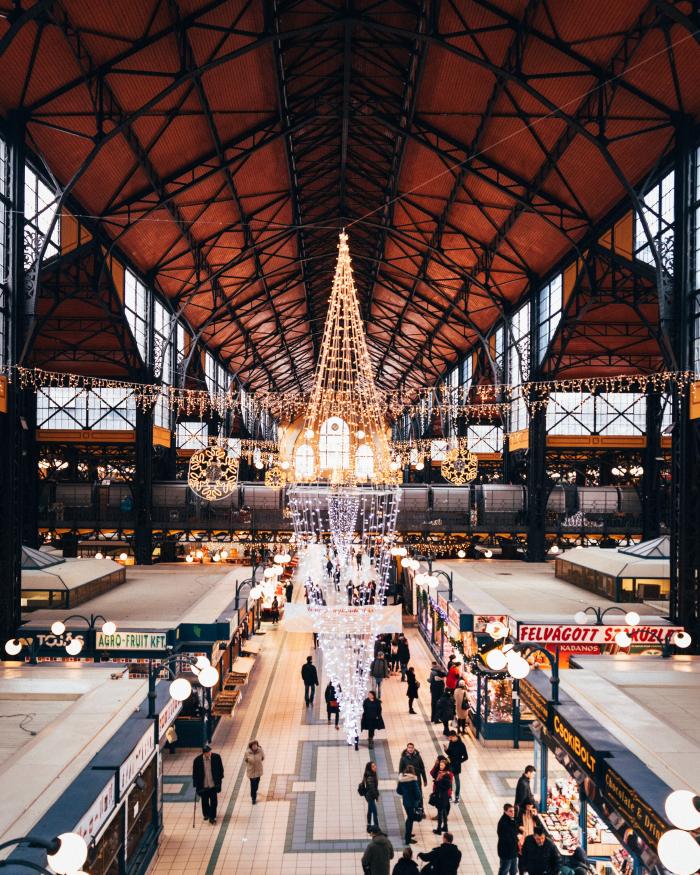
Let's start with Austria's close but at the same time unusual neighbor, Hungary. Valentine kindly told me about the peculiarities of the New Year's festivities in Hungary.
Vlada: Hi! Thank you for making time for this interview. Please tell us about New Year’s Eve in Hungary. I know that Hungarians first celebrate Christmas, and only then the New Year.
Valentine: Hello! Yes, that's right. First, on the 24th of December, we celebrate Christmas, and then on the night of the 31st of January, we celebrate New Year’s. During the last 10 seconds of the year, we count down till New Year comes and after that we wish each other all the best for the new year. Also, people like to make New Year's resolutions, promises to themselves to fulfill during the next year. It is a tradition to eat pork because it brings you good luck.
Vlada: Oh, how interesting! We have a similar tradition in Russia, only difference being that we count the last 12 seconds. Since we are talking about food, please tell us what other traditional dishes there are that can be found on the table in every home on New Year’s Eve in Hungary.
Valentine: Let me think. I would say either fish or lentil stew because they make you rich. We believe: the more scales a fish has or the more lentil you eat, the richer you become.

Vlada: What a useful tradition, I might just have to try it too! But what about home decorations and gifts?
Valentine: Try it! (laughs) As you correctly stated at the beginning, we celebrate Christmas before the New Year’s, therefore we decorate the house on the 20th of December and leave the decorations for New Year’s too. Usually, we decorate the outside of our houses with strings of lights and have a Christmas tree also decorated with lights, ornaments, and a single special ornament on the top, usually a star. The decorations from Christmas remain during New Year’s celebrations too. Speaking of gifts, we only gift each other presents at Christmas and simply choose to celebrate together with others on New Year’s Eve. People receive all kinds of gifts for Christmas, but wine, champagne and pálinka (a typical booze in Hungary) are the most common. However, that’s only the case for adults (winks and laughs). But of course, children are not left without gifts either. They don't get “pálinka”, but during Christmas good children get what they asked for from Santa (mostly toys), and bad children get coal from the Krampus.
Vlada: I see, I see. Good, and what about songs, movies? Do you usually watch Hungarian films or international ones?
Valentine: Home Alone is the most typical movie for Christmas, however there is none for New Year’s. We also sing Jingle Bells during the holidays. So, nothing especially Hungarian. I am sorry. (smiles)
Vlada: Got it, thanks! Well, on to the last question. Does Santa Claus visit you on New Year’s or Christmas?
Valentine: Yes, of course! His name is Joulupukki, and he lives in Finland. He is tall, has a long white beard, carries a red bag for presents and is rather slim. He only comes during Christmas though, so there is no special person for New Year.
Vlada: What an athletic Santa Claus you have! In Russia he also delivers gifts, albeit on New Year's Eve. And our Santa Claus is not slim at all. (laughs) Well, Valentine, thank you very much for the story about Hungarian New Year’s! I think all our readers will be very interested to know how to wish somebody Merry Christmas and Happy New Year in Hungarian.
Valentine: With pleasure! Thank you for inviting me to this conversation! I wish you and all our readers happy holidays! Boldog Karácsonyt és Boldog Új Évet Kívánok!!! (B.Ú.É.K)
#2 New Year's in Serbia. With Nataša Maksimović.
And now let’s move on to another European country – which is by the way orthodox – so it’ll be interesting to find out how they celebrate New Year’s Eve, considering that it takes place before the Christmas. Natasha from Serbia has kindly agreed to tell me and you, dear readers, about the traditions of celebrating New Year’s in her home country.
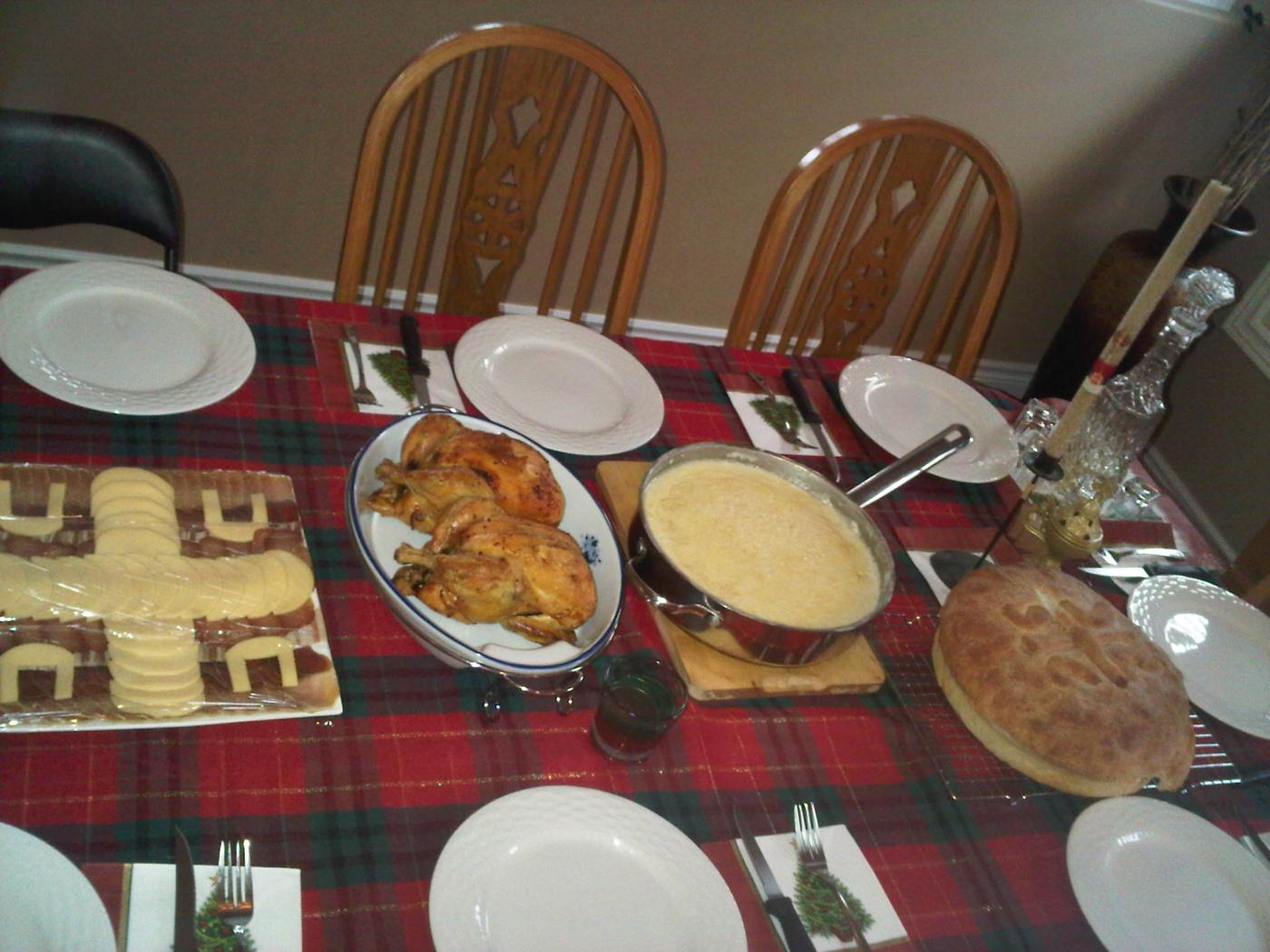
Vlada: Hello Natasha! Thanks for your time! Please tell us about New Year’s in Serbia.
Natascha: Hello Vlada! With pleasure! I just came from the Christmas market, which reminded me of our traditional fairs in Serbia, although we usually have more meat and all kinds of dishes. On to the topic of New Year’s – we celebrate it like most countries, in the night between the 31st of December and January the 1st. We count the remaining seconds till midnight and when it comes, we kiss and hug our family, friends, partners, kids, or whoever we are celebrating with. In Serbia they say how you spend the New Year’s Eve is how the upcoming year is going to be. If you were happy and healthy, that will only be even better, if you were sad and alone ... well, then the other option.
Vlada: Oh, yes, yes! We also say that in my country! It turns out that not only our language is similar, but also our traditions. (smiles) But what about your cuisine? What dishes do you usually eat on New Year's Eve?
Natascha: I can show you pictures! Everything looks very appetizing. A variety of dishes with meat, salads, homemade bread (Pogača), Ajvar and of course our mothers or grandmothers need to have a dessert, which is usually any kind of cake that the entire family enjoys, known as New Year’s cake or simply, the family’s favourite cake.
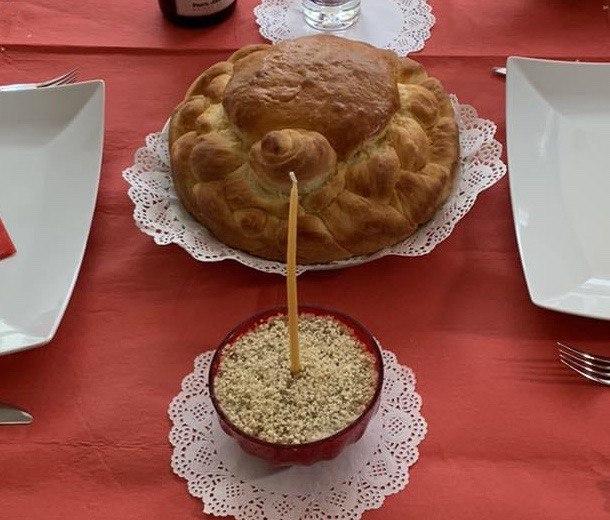
Vlada: It looks delicious! What gifts do you usually give to adults and children?
Natascha: Adults usually gift each other something that comes from the heart. Children usually receive some toys they wished for. Small, nicely wrapped presents are usually placed in a huge bag filled with candy and snacks. We call them Paketić (like the German word “Päckchen”).
Vlada: Your Santa Claus seems very similar to the Russian Santa Claus! Just looking at this Paketić brings back memories of my childhood. What is the name of your Santa Claus?
Natascha: His name is “Deda Mraz”, and he looks like a stereotypical Santa Claus, an old person with a white beard and moustache, dressed in red. He slides down the chimney and brings presents, however he needs to be quiet, so the children won’t see him. In many houses, especially modern ones, Santa comes and delivers the presents to the children directly. Personally, I prefer the first story as many from the older generations do.
Vlada: Oh, that’s so cute!! But yes, the first one sounds way more mysterious! Well, thank you so much for your time! And finally, I would like to ask you to wish our readers Merry Christmas and a Happy New Year in your native language.
Natascha: Srećna Nova Godina! Which means Happy New Year! And for Christmas on 7th of January we say: Srećan Božić, Hristos se rodi! And the other person needs to say: „Vaistinu se rodi! “.
Vlada: Srećna Nova Godina, Natascha!
#3 New Year's in Austria. With Gabriel Josef Zutz.
To finish our article on the traditions of celebrating New Year’s Eve in various European countries, I would like to have an interview with a representative of Austria, so this section might be especially interesting for foreign students! Gabriel, born and raised in Vienna, will be the person representing Austria today.
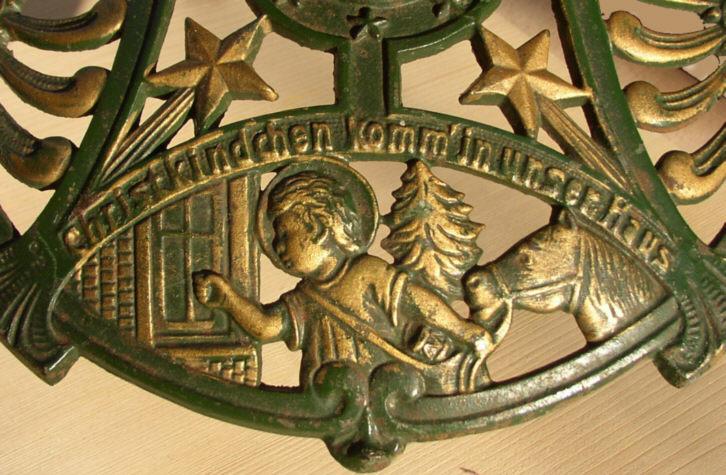
Vlada: Hey, Gabriel! I know that you study law and work, which is why you are very busy. Thank you so much for taking some time to talk about the Austrian New Year’s traditions, despite your busy schedule!
Gabriel: Hi, Vlada! No problem, at all. I'm glad that I get the chance to represent my country and explain Austrian New Year’s Eve to our international readers. In general, like all European countries, Austria celebrates New Year’s on the night between the 31st of December and the 1st of January. The arrival of the New Year is marked by a huge number of fireworks, which are literally everywhere. It’s always a very festive event to behold!
Vlada: I wish I could see them this year! But fireworks are lit after the onset of the new year, the chiming clock. What happens before the chime?
Gabriel: Do you mean any special traditions? Many people make New Year's resolutions. And before the New Year arrives, we decorate our houses during Christmas, since it's still the holiday season.
Vlada: I see. Usually, I ask everyone about the culinary features of their country’s New Year's festivities. In Hungary, fish or lentil stew is prepared, and in Serbia, homemade bread (Pogača) and Ajvar. What about Austria?
Gabriel: We don't have any special New Year’s dish, or, at the very least, I have never heard about one. (smiles)
Vlada: Okay, and what do you usually gift each other on New Year’s? Probably something insignificant since you've already received presents for Christmas.
Gabriel: Yes, you’re right. We usually don’t present gifts to each other for New Year. We just wish each other "Einen guten Rutsch ins neue Jahr", which roughly translates to something like "slide well into the New Year".
Vlada: Very well. I hope we all get the opportunity to have a good slide into the upcoming New Year! (smiles) Are there any Austrian or traditional movies that families watch during this time?
Gabriel: I think we usually watch American movies such as “Home Alone" and in Austria we have a long tradition of Christmas songs, the most popular of them is probably "Stille Nacht" ("silent night").
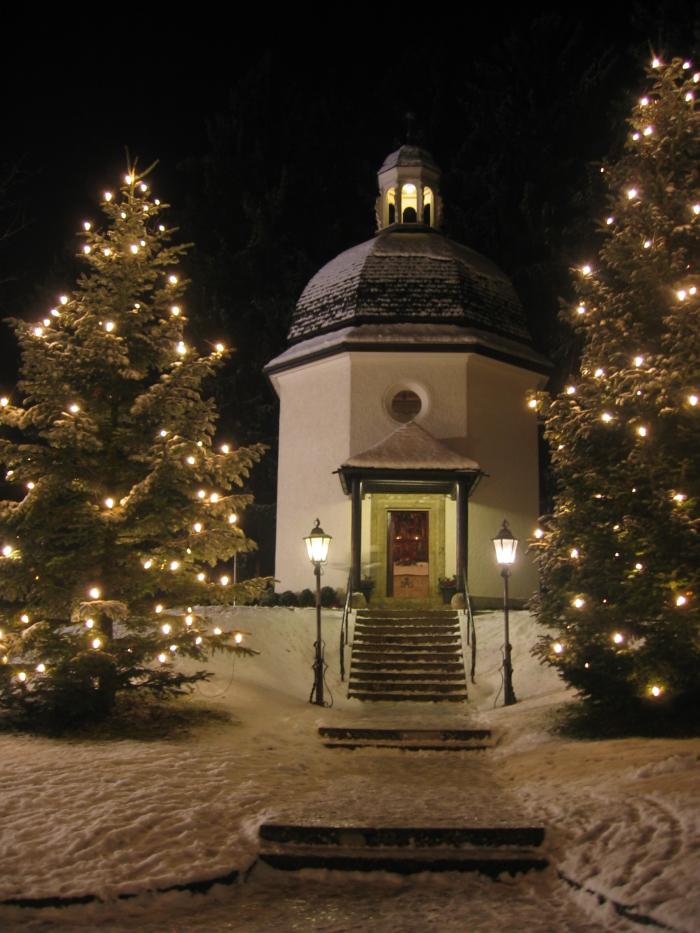
(c) Gakuro CC BY-SA 3.0, via Wikimedia Commons
Vlada: I know it! Such a beautiful song! And “Home alone” is a classic! And finally, I can't help but ask you about Santa Claus. What is his name in Austria and when does he come? New Year’s or Christmas?
Gabriel: On Christmas Eve the "Christkind" comes, which is Christ in the form of a child. He is usually depicted as a childlike angel or a putto, angels that look like Cupid/Eros.
Vlada: So, then the children are not waiting on Santa Claus? (looks confused) Interesting! And finally, I would like to ask you to wish our readers a Happy New Year in your native language.
Gabriel: Frohe Weihnachten und einen guten Rutsch ins neue Jahr, dear readers!
Vlada: Thank you very much, Gabriel, for your time! Merry Christmas and Happy New Year to you and your family!
This concludes the first part of our interviews with students from our dorm "Thomas-Morus-Heim". In the second part of my blog more foreign students will be happy to tell you and me about the traditions of celebrating New Year’s in more distant corners of the planet! Intrigued? Read our next article!
About the author
Hi, I'm Vlada Petrova and I am from Russia. I currently taking up Masters in Marketing at the WU, and I currently live in Thomas-Morus-Heim.
Useful links
- "New Year's worldwide" part 2
- The student residence "Thomas-Morus-Heim" in Vienna
- Blog "An Auslandssemester at the Uni Wien" by Anna Whitehead
